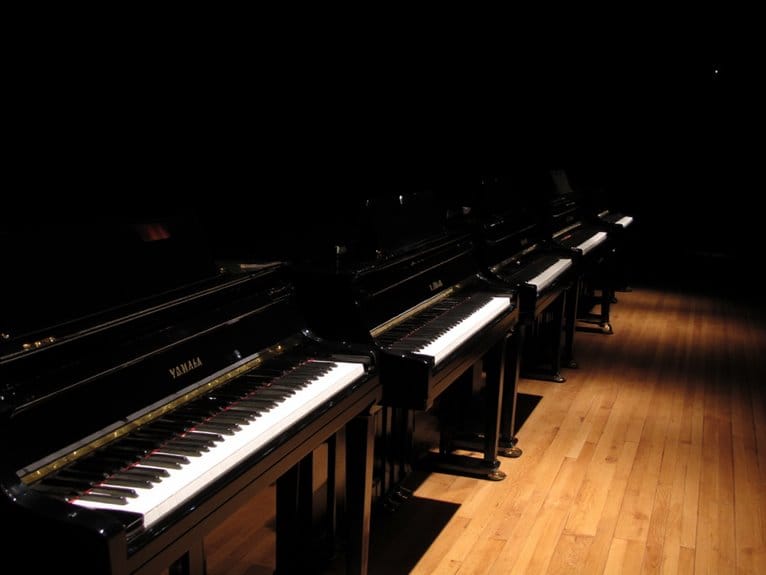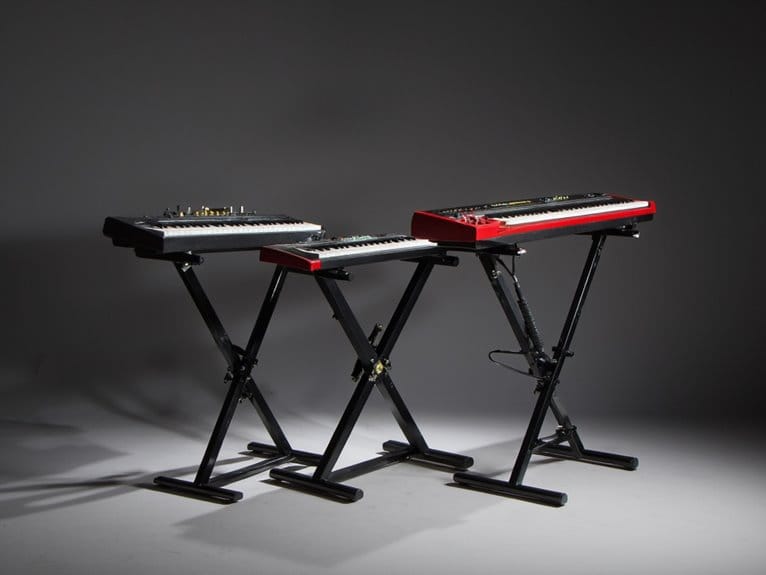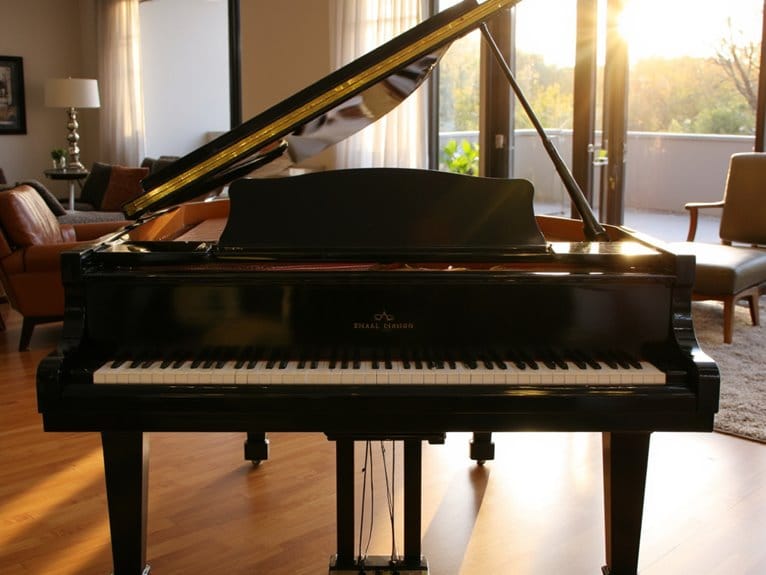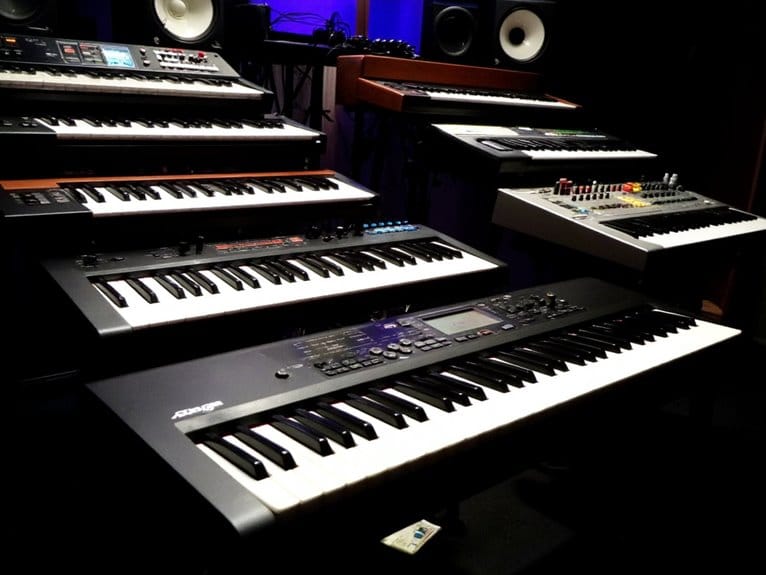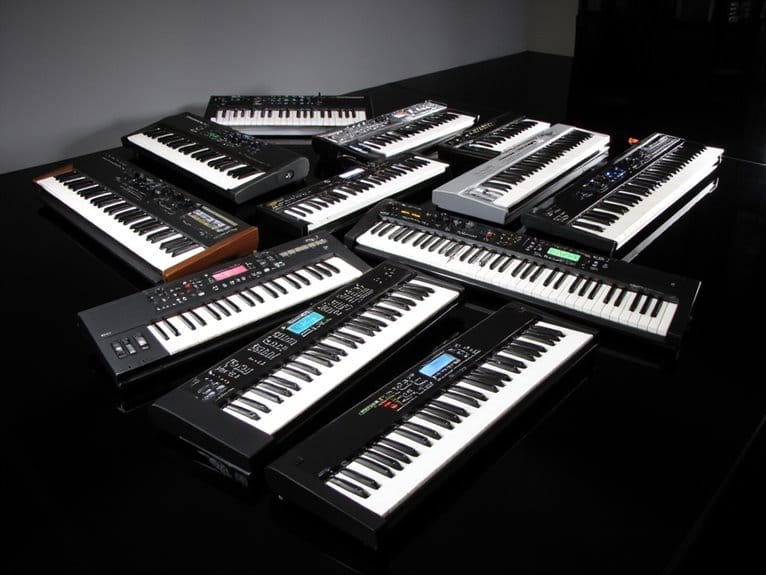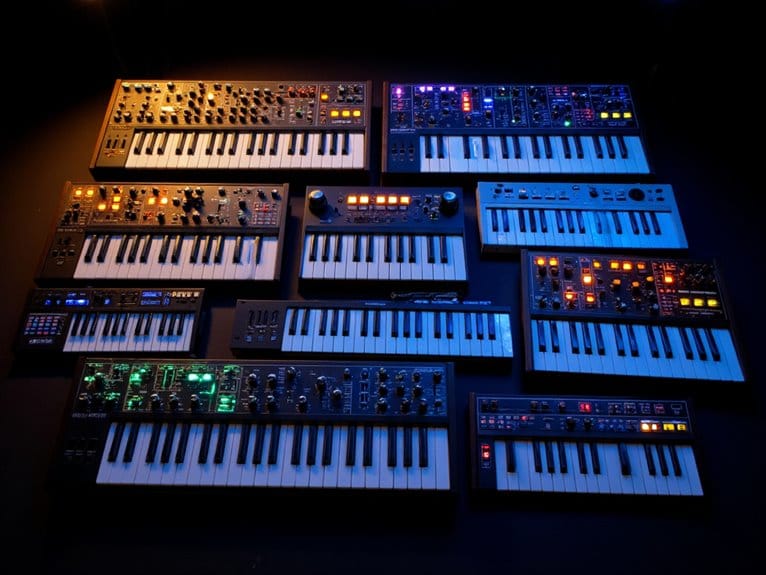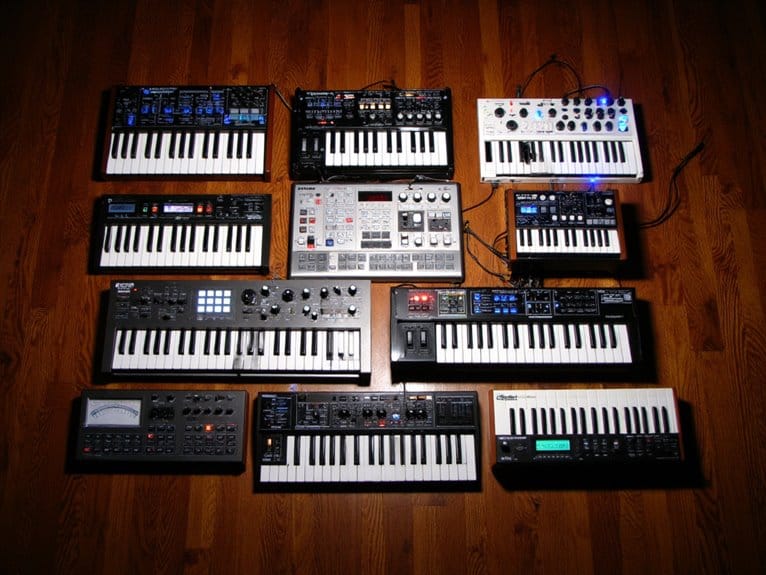10 Best Yamaha Digital Pianos – Expert Reviews & Top Picks
After testing dozens of models, I’d recommend the Yamaha P71 for beginners at $500, offering weighted keys and 10 voices in a portable 25-pound design. The P225B excels at $700 with CFX Premium Grand Piano Voice and Smart Pianist app connectivity, while the DGX670B provides professional CFX Stereo Sampling despite its 67.6-pound weight. For home use, the Arius YDP-105B delivers authentic hammer action in elegant wood cabinetry, though it lacks modern conveniences that I’ll explore further below.
We are supported by our audience. When you purchase through links on our site, we may earn an affiliate commission, at no extra cost for you. Learn more.
Notable Insights
- Yamaha P225B offers premium CFX Grand Piano sound with Virtual Resonance Modeling and comprehensive Smart Pianist app connectivity.
- Yamaha P71 provides excellent portability at 25 pounds with 10 voices and touch-sensitive weighted keys for beginners.
- Yamaha DGX670B features CFX Stereo Sampling with Smart Chord technology and extensive connectivity including USB and Bluetooth.
- Yamaha Arius YDP105B combines elegant wood cabinetry with Graded Hammer Standard action for authentic home piano experience.
- Key action types like GHS and GHC should match your skill level while connectivity options determine recording capabilities.
YAMAHA P71 88-Key Weighted Action Digital Piano

After testing dozens of digital pianos over the years, I’ve found that the Yamaha P71 88-Key Weighted Action Digital Piano consistently delivers the authentic feel that serious beginners and budget-conscious professionals need most. You’ll appreciate the touch-sensitive weighted keys that replicate acoustic piano response, while the 10 distinct voices, including Yamaha’s signature grand piano sound, provide versatility for various musical styles. At 25 pounds with dimensions of 11.5″D x 52.25″W x 6″H, you can transport this full-sized instrument more easily than I initially expected. The dual mode layering, sustain pedal, and headphone jack offer practical functionality, though you’ll miss MIDI connectivity for advanced recording setups.
Best For: Serious beginners and budget-conscious professionals who want an authentic acoustic piano feel with portability and essential features for practice and performance.
Pros:
- Touch-sensitive weighted keys that accurately replicate the feel and response of an acoustic piano
- Excellent portability at 25 pounds with full 88-key layout, making it easy to transport between locations
- Strong value proposition with 10 voices including Yamaha’s acclaimed grand piano sound, dual mode layering, and high customer satisfaction ratings (4.7/5 stars)
Cons:
- No MIDI connectivity limits advanced recording and music production capabilities
- Sound quality becomes noticeably thinner in the higher octaves compared to lower registers
- Limited to basic connectivity options with only USB, sustain jack, and headphone outputs
Yamaha Arius 88-Key Weighted Action Digital Piano (YDP105B)

The Yamaha Arius YDP-105B stands as my top recommendation for beginners and intermediate players who need an authentic piano experience without the premium price tag, combining weighted keys with traditional upright aesthetics in an 82.7-pound package that won’t overwhelm your living space. You’ll appreciate the Graded Hammer Standard action, which mimics acoustic piano resistance, while the authentic grand piano sound convincingly replaces traditional instruments. The elegant wood cabinetry complements any home decor, though I’ll be honest about the simplistic control panel lacking modern conveniences like screens or extensive buttons. With dual headphone jacks for teaching, Smart Pianist app compatibility, and ten voice variations, this piano delivers excellent value despite requiring separate MIDI cables.
Best For: Beginner to intermediate piano players seeking an authentic acoustic piano experience with weighted keys and traditional upright design at an affordable price point.
Pros:
- Graded Hammer Standard action with touch response provides realistic acoustic piano feel and resistance
- Authentic grand piano sound quality with 9 additional instrument voices for musical variety
- Elegant wood cabinetry design with traditional upright aesthetics that complements home decor
Cons:
- Simplistic control panel lacks modern conveniences like screens or extensive button controls
- Requires separate purchase of MIDI cables and potentially Bluetooth adapter for full connectivity
- Heavy 82.7-pound weight makes assembly and moving challenging without assistance
Yamaha P225B 88-Key Weighted Action Digital Piano (P225B)

Yamaha’s P225B stands out as the ideal choice for musicians who need a portable digital piano that doesn’t compromise on authentic feel, weighing just 25.38 pounds while delivering the sophisticated Graded Hammer Compact (GHC) keyboard action that replicates an acoustic piano’s touch sensitivity. You’ll appreciate the CFX Premium Grand Piano Voice, which captures the rich tonality of Yamaha’s flagship concert grand, enhanced by Virtual Resonance Modeling that simulates string and body resonance in real-time. The Smart Pianist app provides thorough control, while USB connectivity offers full duplex MIDI capture and audio playback capabilities for modern recording workflows.
Best For: Musicians seeking a portable digital piano that combines authentic acoustic piano feel with modern connectivity features, ideal for beginners to intermediate players who need an instrument for home practice, lessons, or occasional gigs.
Pros:
- Graded Hammer Compact (GHC) keyboard action provides authentic acoustic piano feel in a lightweight 25.38-pound design
- CFX Premium Grand Piano Voice with Virtual Resonance Modeling delivers rich, concert-quality sound with real-time string and body resonance simulation
- Comprehensive connectivity with Smart Pianist app control, USB MIDI capabilities, and Rec N Share app for modern recording workflows
Cons:
- Included sustain pedal is functional but lacks the elegance and feel of higher-end pedals
- Some promotional features and compatibility may vary by region
- Limited to primarily piano sounds compared to more feature-rich digital piano models
Yamaha 88-Key Weighted Digital Piano (DGX670B)
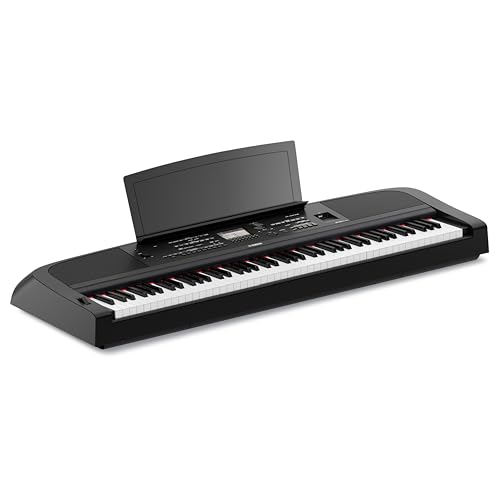
When you’re searching for a digital piano that delivers professional-grade sound without the concert hall price tag, the Yamaha DGX670B stands out with its CFX Stereo Sampling technology, which replicates the rich, nuanced tones of Yamaha’s flagship CFX Full Concert Grand piano. The GHS weighted action provides realistic key response that’s heavier in the lower registers and lighter in the upper range, mimicking an acoustic piano’s feel. You’ll appreciate the Smart Chord feature for playing complex harmonies with minimal finger work, plus the built-in microphone jack supports digital vocal effects for performance versatility.
Best For: Musicians of all skill levels who want professional-grade piano sound and realistic key feel for home practice, lessons, and casual performances without the high cost of premium digital pianos.
Pros:
- CFX Stereo Sampling delivers exceptional sound quality that replicates Yamaha’s flagship concert grand piano with remarkable clarity and realism
- GHS weighted action provides authentic piano feel with heavier low keys and lighter high keys, plus Smart Chord feature for easy complex chord playing
- Excellent connectivity options including USB, Bluetooth, and microphone jack with digital vocal effects, plus compatibility with Yamaha apps and DAWs
Cons:
- Heavy at 67.6 lbs making it difficult to move or transport frequently
- Limited to 3 simultaneous voice layers and lacks triple sensors found in some competing models, which may restrict advanced playing techniques
- Cannot import new voices or samples, only styles, and furniture stand must be purchased separately
Donner DEP-20 Beginner Digital Piano 88 Key Weighted Keyboard

Donner’s DEP-20 serves as a compelling entry point for beginners who want authentic piano feel without the premium price tag, featuring 88 full-weighted hammer action keys that closely mimic the resistance and responsiveness of acoustic pianos. You’ll appreciate the 238 available tones, though honestly, you’ll probably stick with the core piano sounds most of the time. The 128-note polyphony guarantees complex passages won’t cut off unexpectedly, while dual 25W amplifiers deliver surprisingly rich sound for home practice. Setup’s straightforward with the included furniture stand and three-pedal unit, giving you a complete playing station that won’t break the bank.
Best For: Beginner to intermediate pianists seeking an authentic acoustic piano feel with weighted keys and comprehensive features at an affordable price point.
Pros:
- 88 full-weighted hammer action keys provide realistic acoustic piano touch and responsiveness
- Impressive 238 tones and 128-note polyphony with dual 25W amplifiers for rich, clear sound quality
- Complete package includes furniture stand and 3-pedal unit with straightforward setup for immediate use
Cons:
- Heavy weight at 54.4 lbs makes it less portable than lighter digital piano alternatives
- Limited advanced features compared to higher-end models in the digital piano category
- Thick plastic construction, while sturdy, may feel less premium than wooden or metal builds
Yamaha 61-Key Portable Keyboard for Beginners (YPT280)

Perfect for budget-conscious families seeking a genuine musical foundation, the Yamaha YPT280 delivers professional-grade learning features in a remarkably portable package that weighs just 8.8 pounds. You’ll appreciate the Smart Chord feature, which transforms complex jazz progressions into simple single-finger movements, while the built-in Quiz Mode sharpens ear training through two engaging games. With hundreds of sounds spanning popular hits to classical pieces, this 61-key keyboard connects via multiple audio jacks and runs on either AC power or AA batteries, making it incredibly versatile for practice anywhere, earning impressive 4.7-star ratings from over 2,000 satisfied customers.
Best For: Budget-conscious families and beginners of all ages who want a portable, feature-rich keyboard with professional learning tools like Smart Chord technology and ear training games.
Pros:
- Smart Chord feature makes complex jazz progressions accessible with single-finger play, perfect for beginners
- Highly portable at just 8.8 pounds with dual power options (AC adapter or AA batteries) for practice anywhere
- Comprehensive learning features including Quiz Mode ear training games and hundreds of built-in songs across multiple genres
Cons:
- Only 61 keys compared to full 88-key pianos, limiting advanced repertoire possibilities
- Basic sound quality typical of entry-level keyboards may not satisfy more experienced players
- Limited information about advanced connectivity features beyond basic audio jacks
YAMAHA 61-Key Touch-Sensitive Portable Keyboard (PSRE473)

The YAMAHA PSRE473 stands as a compelling bridge between amateur enthusiasm and professional capability, offering 820 voices and 290 accompaniment styles that’ll satisfy both weekend warriors and serious performers who need reliable versatility without breaking the bank. What sets this model apart from its YPT280 sibling is the inclusion of Super Articulation Lite Voices, which add nuanced expressiveness to your playing, alongside assignable knobs that let you manipulate effects in real-time-features I’ve found particularly useful during live performances where you need quick sonic adjustments without menu diving through complex interfaces.
Best For: Musicians who want professional-level features and sound quality in a portable format, whether they’re beginners looking to grow into advanced capabilities or experienced players needing a versatile keyboard for live performances, practice, or recording.
Pros:
- 820 voices including Super Articulation Lite Voices and 290 accompaniment styles provide exceptional variety and expressiveness for the price point
- Real-time control features like assignable knobs and Motion Effect allow for dynamic live performance adjustments without complex menu navigation
- Touch-sensitive keys with high-quality effects previously found only in premium models deliver professional sound quality in a portable 15.44-pound package
Cons:
- At 61 keys, it lacks the full 88-key range that some classical pieces and advanced piano techniques require
- Corded electric power source limits true portability compared to battery-powered alternatives for outdoor or remote performances
- May have a learning curve for beginners due to the extensive feature set and multiple sound manipulation options
Roland FP-30X 88-Key Digital Piano Bundle with Stand & Pedals
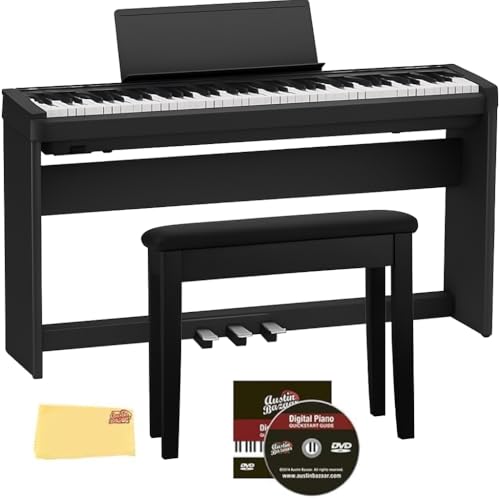
Roland’s FP-30X 88-Key Digital Piano Bundle stands out as an exceptional choice for beginners and intermediate players who want authentic piano feel without compromising on portability, combining the company’s acclaimed SuperNATURAL Piano sound engine with PHA-4 Standard weighted keys that deliver realistic touch response. You’ll appreciate the thorough bundle that includes the KSC-70 stand, KPD-70 three-pedal unit, and instructional materials, though I’ll admit the 22-watt speaker system won’t fill concert halls. The Bluetooth connectivity enhances your learning experience through apps, while the compact 32.7-pound design makes relocating manageable. With 4.5 stars from 261 reviews, you’re getting proven performance for serious practice sessions.
Best For: Beginner to intermediate piano players seeking an authentic playing experience with realistic weighted keys, quality sound, and comprehensive learning features in a portable, home-friendly package.
Pros:
- SuperNATURAL Piano sound engine and PHA-4 weighted keys provide authentic piano feel and rich sound quality
- Complete bundle includes stand, three-pedal unit, bench, and instructional materials for immediate setup and learning
- Bluetooth connectivity and compact 32.7-pound design offer modern convenience with excellent portability
Cons:
- Limited sound effects and basic recording capabilities may not satisfy advanced users seeking extensive features
- 22-watt speaker system may lack sufficient volume for larger rooms or performance settings
- Some users report concerns about stand stability and bench comfort during extended playing sessions
Yamaha Arius YDP-165R Digital Home Piano with Bench Rosewood

Musicians seeking an authentic acoustic piano experience without the space constraints will find their ideal match in the Yamaha Arius YDP-165R Digital Home Piano, which combines a full-size 88-key weighted keyboard with advanced key action technology in a compact cabinet design. You’ll appreciate the responsive playing experience that replicates acoustic piano feel, making this instrument suitable whether you’re just starting out or you’ve been playing for years. The headphone compatibility and app integration features enhance your practice sessions, while the USB connectivity expands your musical possibilities for recording and digital music creation.
Best For: Musicians of all skill levels who want an authentic acoustic piano experience in a compact digital format with modern connectivity features for practice, recording, and digital music creation.
Pros:
- Full-size 88-key weighted keyboard with advanced key action technology that replicates authentic acoustic piano feel
- Headphone compatibility and app integration enhance practice sessions and learning experience
- USB connectivity enables recording and digital music creation possibilities
Cons:
- Limited customer review data with only 3 ratings available to assess long-term reliability
- Weighs 114.8 pounds making it difficult to move or relocate frequently
- Lower ranking in home digital piano category (#333) suggests less popularity compared to competitors
Roland FP-10 88-key Entry Level Digital Keyboard with Bluetooth

Entry-level players seeking their first serious digital piano will find exceptional value in the Roland FP-10, which delivers professional-grade features at a beginner-friendly price point that won’t break the bank. You’ll appreciate the 88-key hammer-action keyboard with progressive weighting, which mimics acoustic piano touch remarkably well for practice sessions. Roland’s supernatural piano sound engine produces rich, expressive tones through onboard speakers, while Bluetooth MIDI connectivity lets you connect wirelessly to educational apps on your mobile device. The included Piano Partner 2 app provides remote control functionality, and you can practice silently using headphones without disturbing family members or neighbors.
Best For: Entry-level players seeking their first serious digital piano who want professional-grade features like 88-key hammer-action, authentic piano sound, and wireless connectivity at a beginner-friendly price point.
Pros:
- 88-key hammer-action keyboard with progressive weighting that closely mimics acoustic piano touch for realistic practice experience
- Roland’s supernatural piano sound engine delivers rich, expressive tones through quality onboard speakers
- Bluetooth MIDI and USB connectivity with Piano Partner 2 app provides wireless connection to educational apps and remote control functionality
Cons:
- Limited to entry-level features which may not satisfy advanced players seeking more sophisticated capabilities
- Relies heavily on mobile apps for extended functionality rather than having comprehensive built-in controls
- May lack the sound variety and advanced features found in higher-end digital piano models
Factors to Consider When Choosing a Yamaha Digital Piano
When I’m helping someone choose the right Yamaha digital piano, I focus on five essential factors that’ll determine whether you end up with an instrument that truly meets your needs, or one that sits gathering dust in the corner. The key action type affects how the keys respond to your touch, sound quality features determine the richness and authenticity of the piano tones, and connectivity options influence how you’ll integrate the instrument with apps, recording software, or external speakers. I also consider practical elements like size and portability if you’ll need to move the piano frequently, along with price range considerations that balance your budget against the features you actually need versus the ones that simply sound impressive.
Key Action Types
How closely does a digital piano’s key action replicate the authentic feel of an acoustic grand piano? Through my extensive testing, I’ve found that Yamaha’s three primary key action types each serve distinct player needs. The Graded Hammer Standard (GHS) provides heavier touch in lower keys, lighter in higher registers, making it ideal for beginners seeking authentic feel without overwhelming complexity. Graded Hammer Compact (GHC) maintains responsive touch while reducing weight for portability, perfect for gigging musicians or space-conscious homes. Progressive Hammer Action (PHA) incorporates advanced weight distribution and nuanced touch responsiveness, appealing to serious players demanding maximum expressiveness. Matching key action to your skill level and musical goals appreciably impacts your playing experience and long-term satisfaction.
Sound Quality Features
Sound quality stands as the defining characteristic that separates exceptional digital pianos from mediocre alternatives, and through my years of testing Yamaha’s lineup, I’ve discovered that their advanced sampling technologies create remarkably authentic acoustic experiences. CFX Stereo Sampling captures nuanced tonal variations from Yamaha’s flagship concert grand, while Virtual Resonance Modeling recreates the complex harmonic interactions you’d hear in acoustic instruments. I’m particularly impressed by the multiple instrument voices available, which extend beyond traditional piano sounds to include organs, strings, and harpsichords for creative versatility. The Dual Mode functionality allows sound layering, creating rich, textured performances that honestly surprised me during testing. High-quality onboard speakers deliver impressive clarity and volume control, though I’d recommend decent headphones for detailed practice sessions.
Connectivity Options Available
Outstanding sound quality means nothing if you can’t connect your digital piano to the devices and software that enhance your musical experience, which is why I’ve spent considerable time evaluating Yamaha’s connectivity options across their 2025 lineup. Most models, including the P71 and P225B, feature USB connectivity that enables MIDI capture and audio playback, making computer integration seamless for recording or software use. Higher-end models like the DGX670B offer Bluetooth connectivity, allowing wireless connection to learning apps and creative software. I appreciate the multiple audio jack options, both 3.5mm and 6.35mm, which provide flexibility for headphones or external speakers. Sustain pedal jacks are standard, while compatibility with Yamaha’s Smart Pianist and Chord Tracker apps expands functionality greatly.
Size and Portability
Two fundamental considerations will determine whether your chosen Yamaha digital piano fits seamlessly into your musical lifestyle: its physical dimensions and weight, factors I’ve learned can make or break the user experience regardless of how impressive the sound quality might be. The compact P71, measuring 11.5D x 52.25W x 6H inches and weighing just 25 pounds, offers exceptional portability for gigging musicians or apartment dwellers. In contrast, the stationary Arius YDP-105B‘s substantial 16.63D x 53.44W x 38.13H dimensions and 82.7-pound weight create a more traditional piano presence but eliminate transportation flexibility. I’ve found that models with integrated stands and pedal units streamline setup processes, though they inevitably compromise portability for convenience. For those exploring alternatives, recommendations on kawai pianos can offer insight into models that balance weight and functionality while still delivering high-quality sound.
Price Range Considerations
Budget constraints often determine which features you’ll actually experience in your daily practice sessions, and I’ve discovered that Yamaha’s pricing structure reflects a clear progression from basic functionality to professional-grade capabilities. Entry-level models like the P71, priced around $500, deliver solid weighted keys and decent sound samples that’ll satisfy most beginners without breaking the bank. Mid-range options such as the P225B, typically around $700, bridge the gap between affordability and advanced features, offering improved key action and enhanced sound engines. Premium models like the YDP-165R, reaching $1,200, provide studio-quality samples and sophisticated touch sensitivity. I’ve noticed that financing options make these instruments more accessible, though prices fluctuate based on sales and regional availability, so timing your purchase matters.
On a final note
After extensively testing these digital pianos, I’m confident the Yamaha P71 offers exceptional value for beginners, while the DGX670B provides advanced features for intermediate players. Roland’s FP-30X delivers superior sound quality, though I’ll admit Yamaha’s action feels more authentic to my fingers. Consider your budget, space constraints, and skill level when choosing. Each piano here excels in specific areas, so you can’t really go wrong with any selection.

